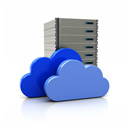What is cloud computing?
Cloud computing, often referred to as simply “the cloud,” is the delivery of on-demand computing resources—everything from applications to data centers—over the Internet on a pay-for-use basis.
Some analysts and vendors define cloud computing narrowly as an updated version of utility computing: basically virtual servers available over the Internet. Others go very broad, arguing anything you consume outside the firewall is “in the cloud,” including conventional outsourcing.
What are the advantages of cloud computing?
If used properly and to the extent necessary, working with data in the cloud can vastly benefit all types of businesses.
Some of the advantages of this technology are:
- Cost Efficient
Cloud computing is probably the most cost efficient method to use, maintain and upgrade. Traditional desktop software costs companies a lot in terms of finance. Adding up the licensing fees for multiple users can prove to be very expensive for the establishment concerned. The cloud, on the other hand, is available at much cheaper rates and hence, can significantly lower the company’s IT expenses. Besides, there are many one-time-payment, pay-as-you-go and other scalable options available, which makes it very reasonable for the company in question.
- Almost Unlimited Storage
Storing information in the cloud gives you almost unlimited storage capacity. Hence, you no more need to worry about running out of storage space or increasing your current storage space availability.
- Backup and Recovery
Since all your data is stored in the cloud, backing it up and restoring the same is relatively much easier than storing the same on a physical device. Furthermore, most cloud service providers are usually competent enough to handle recovery of information. Hence, this makes the entire process of backup and recovery much simpler than other traditional methods of data storage.
- Automatic Software Integration
In the cloud, software integration is usually something that occurs automatically. This means that you do not need to take additional efforts to customize and integrate your applications as per your preferences. This aspect usually takes care of itself. Not only that, cloud computing allows you to customize your options with great ease. Hence, you can handpick just those services and software applications that you think will best suit your particular enterprise.
- Easy Access to Information
Once you register yourself in the cloud, you can access the information from anywhere, where there is an Internet connection. This convenient feature lets you move beyond time zone and geographic location issues.
- Quick Deployment
Lastly and most importantly, cloud computing gives you the advantage of quick deployment. Once you opt for this method of functioning, your entire system can be fully functional in a matter of a few minutes. Of course, the amount of time taken here will depend on the exact kind of technology that you need for your business.
What are the disadvantages of cloud computing?
In spite of its many benefits, as mentioned above, cloud computing also has its disadvantages. Businesses, especially smaller ones, need to be aware of these cons before going in for this technology.
- Technical Issues
Though it is true that information and data on the cloud can be accessed anytime and from anywhere at all, there are times when this system can have some serious dysfunction. You should be aware of the fact that this technology is always prone to outages and other technical issues. Even the best cloud service providers run into this kind of trouble, in spite of keeping up high standards of maintenance. Besides, you will need a very good Internet connection to be logged onto the server at all times. You will invariably be stuck in case of network and connectivity problems.
- Security in the Cloud
The other major issue while in the cloud is that of security issues. Before adopting this technology, you should know that you will be surrendering all your company’s sensitive information to a third-party cloud service provider. This could potentially put your company to great risk. Hence, you need to make absolutely sure that you choose the most reliable service provider, who will keep your information totally secure.
- Prone to Attack
Storing information in the cloud could make your company vulnerable to external hack attacks and threats. As you are well aware, nothing on the Internet is completely secure and hence, there is always the lurking possibility of stealth of sensitive data.
Source: www.mobiledevices.about.com/
What is MySQL?
MySQL, the most popular Open Source SQL database management system, is developed, distributed, and supported by Oracle Corporation.
MySQL is an open source relational database management system (RDBMS) based on Structured Query Language (SQL).
The MySQL Database Server is very fast, reliable, scalable, and easy to use.
MySQL Server works in client/server or embedded systems.
What is DNS server?
DNS server is short for Domain Name System (or Service or Server), an Internet service that translates domain names into IP addresses.
Because domain names are alphabetic, they’re easier to remember. The Internet however, is really based on IP addresses. Every time we use a domain name, therefore, a DNS service must translate the name into the corresponding IP address.
What is VPS hosting?
Basically,VPS hosting (Virtual Private Server hosting) is a service that gives us a web server’s hardware to share with others without sharing the software. This means that we can have complete root control over the server as if it was our own dedicated server but we will still share the CPU, RAM, and bandwidth with other users. We can still have guaranteed CPU, disk space, and memory. This means we can install whatever we want. VPS hosting is great for hosting many web sites in an environment where we have almost complete control while still keeping our costs down.







Follow me on Social Media